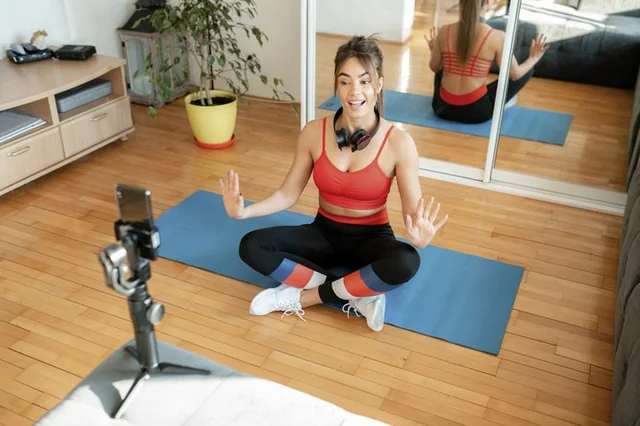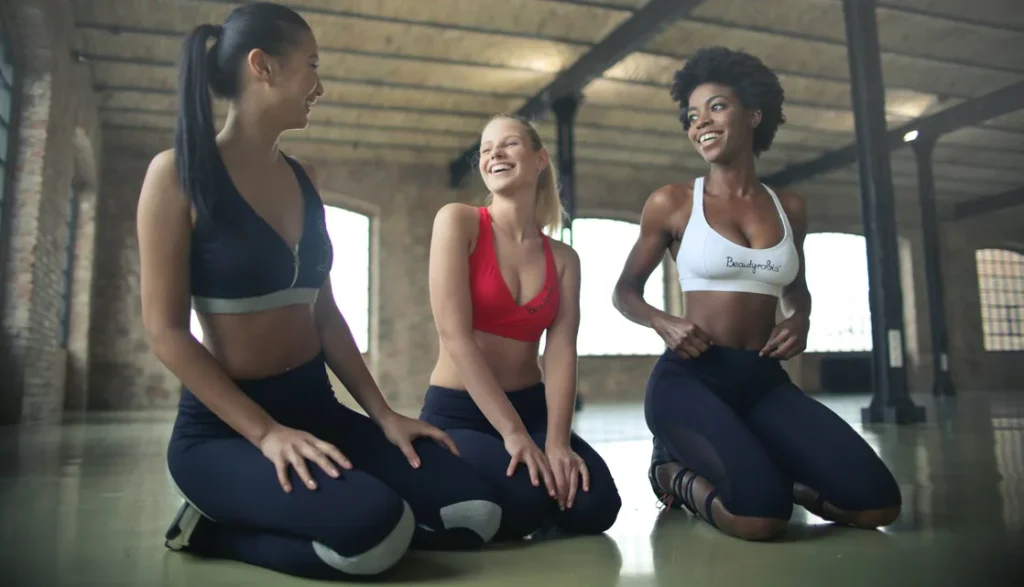The Growing Phenomenon of Objectification in Fitness Spaces
Gyms, once a space purely dedicated to physical health, have increasingly become sites of social interactions, whether positive or negative. While some go to the gym to get in shape, others use it as a space for validation or attention. For women who dress in eye-catching, revealing workout outfits, the attention can be overwhelming and, at times, invasive.
Take the example of a woman who’s been garnering attention for her daring choice of gym wear—tight leggings, crop tops, and sports bras that highlight her physique. While many women feel empowered by choosing outfits that make them feel good about themselves, the downside is the unwanted scrutiny, often from men who view them as nothing more than objects of desire.
This woman’s situation became so extreme that she’s now considering hiring a bodyguard for £2,200 to shield her from the male gaze. While this may sound extreme to some, it reflects the growing discomfort and objectification that many women experience when they simply try to focus on their workouts.

The Double-Edged Sword of Confidence and Attention
On one hand, wearing trendy, sexy gym outfits can boost confidence. Fashionable athletic wear is designed not just for function, but also for form, with bold patterns, sleek cuts, and breathable fabrics that enhance the workout experience. For many, dressing in a way that reflects their personality and style is a form of self-expression and empowerment.
However, on the flip side, some women report feeling overly scrutinized, often experiencing stares, unsolicited comments, and, in the worst cases, even harassment. The gym, a place that should foster self-improvement, becomes a space where women’s bodies are objectified rather than respected for their dedication and hard work.

Why Do Men Gawk?
To understand why some men can’t seem to stop staring, we must acknowledge the psychological and social factors at play. Societal conditioning, media representations of women’s bodies, and biological impulses often contribute to the way men perceive women in revealing clothing. The gym, with its focus on fitness and physicality, often magnifies these tendencies, creating an environment where women’s appearances are scrutinized rather than appreciated for their fitness achievements.
There is also the issue of entitlement. Some men may feel that because they are paying to use the same space, they are entitled to comment on or engage with the women around them. This entitlement often manifests as unwanted attention, whether it be through direct comments, lingering stares, or intrusive behavior.
While not all men behave this way, the issue is prevalent enough to leave some women feeling unsafe or uncomfortable, especially if they are trying to work on their fitness without the added pressure of male attention.

The Rise of Personal Protection in Fitness Spaces
As the issue of harassment and objectification grows, more and more women are taking drastic measures to protect themselves. Enter the bodyguard—a personal security service that many high-profile individuals or women who feel threatened now rely on. The price tag of £2,200 for a bodyguard is significant, but for some women, it’s a necessary investment in their personal safety and peace of mind.
The growing market for personal security services tailored to women is an indication of just how serious the issue has become. Personal bodyguards are hired not just for physical protection, but to provide emotional reassurance and an extra layer of security when navigating spaces that may feel unsafe.
For some women, the idea of a bodyguard at the gym may seem like an exaggeration. However, it’s crucial to recognize that for certain individuals, the constant attention and invasive behavior from others can escalate to the point of anxiety, distress, and even physical confrontation. A bodyguard provides an assurance that they can exercise in peace, without the fear of harassment.

Empowering Women in Fitness Spaces
While the extreme step of hiring a bodyguard may not be the solution for everyone, it highlights a larger societal issue that needs addressing: the objectification of women and the need for respect in shared public spaces like gyms. No one should feel unsafe or uncomfortable while trying to improve themselves physically, and every individual, regardless of gender, should be free to express themselves through their clothing choices without fear of unwanted attention.
Fitness spaces need to be more inclusive and respectful, fostering an environment where everyone feels comfortable working on their health goals. This involves not only educating people about boundaries and respect but also creating policies and spaces where harassment is actively discouraged and addressed.

Final Thoughts
The experience of feeling objectified at the gym may not be something many can relate to, but for those who do, it can be exhausting and overwhelming. The cost of hiring a bodyguard may seem extravagant, but it is a stark reminder of how much women are often forced to go through to protect themselves. Ultimately, this situation underscores a larger cultural issue—one that calls for a fundamental shift in how we view and treat women, both in fitness environments and beyond.
Respect, boundaries, and empathy need to be at the core of every public space, allowing all individuals to thrive and focus on their own well-being without the weight of unwanted attention. It’s time for society to recognize the importance of making spaces like gyms safe, comfortable, and welcoming for everyone.



